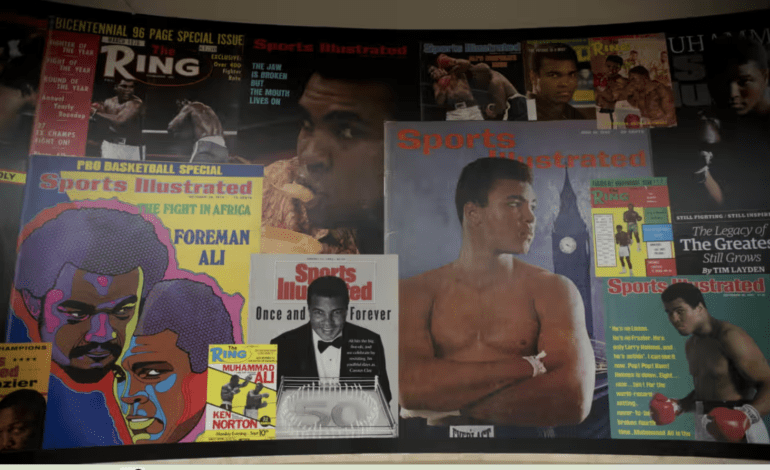TL;DR:
- Arena Group dismisses CEO Ross Levinsohn following AI-generated content scandal at Sports Illustrated.
- Manoj Bhargava appointed interim CEO to address operational efficiency and revenue concerns.
- Futurism’s investigative report exposed fake authors with AI-generated profiles.
- The company denies allegations, attributing controversial articles to the third-party advertiser AdVon Commerce.
- The AdVon Commerce partnership was terminated, and content was removed from Arena websites.
- Sports Illustrated, known for iconic swimsuit editions and literary contributions, faces reputational challenges.
- Levinsohn previously signaled AI integration in journalism.
- The recent restructuring includes the termination of other top executives.
Main AI News:
In a surprising turn of events within the corporate realm, the Arena Group, renowned publisher of the iconic Sports Illustrated magazine, has taken decisive action following the revelation of an unsettling scandal. The scandal, which unfolded in November, exposed a disconcerting practice of publishing articles penned by fictitious authors, accompanied by AI-generated headshots and biographies.
The repercussions of this revelation were felt swiftly, as the Arena Group’s board announced on Monday the termination of CEO Ross Levinsohn’s employment. In his stead, Manoj Bhargava has been appointed as the interim chief executive, marking a pivotal moment in the company’s leadership.
This decision to remove Levinsohn from his position was not hasty but followed a deliberative board meeting aimed at charting a course to “improve the operational efficiency and revenue of the company.” However, conspicuously absent from the official statement was any direct reference to the AI scandal that had rocked the foundations of Sports Illustrated.
The scandal, initially exposed by an investigative report from the esteemed science and technology news publication Futurism, brought to light a roster of fake profiles masquerading as legitimate authors. Among these deceptive personas was “Sora Tanaka,” who purported to be a product reviewer with a penchant for fitness and culinary exploration. Tanaka’s bio boasted, “Sora has always been a fitness guru and loves to try different foods and drinks. Ms. Tanaka is thrilled to bring her fitness and nutritional expertise to the Product Reviews Team and promises to bring you nothing but the best of the best.” The catch? Sora Tanaka does not exist in the real world.
The Arena Group, which had acquired Sports Illustrated in 2019, vehemently denied the allegations and attributed the controversial articles to sourced commercial content from a third-party advertising company, AdVon Commerce. A company spokesperson issued a statement, asserting, “Today, an article was published alleging that Sports Illustrated published AI-generated articles. According to our initial investigation, this is not accurate. A number of AdVon’s e-commerce articles ran on certain Arena websites. We continually monitor our partners and were in the midst of a review when these allegations were raised. AdVon has assured us that all of the articles in question were written and edited by humans … However, we have learned that AdVon had writers use a pen or pseudo name in certain articles to protect author privacy – actions we strongly condemn – and we are removing the content while our internal investigation continues and have since ended the partnership.” As a result, the Arena Group promptly severed its ties with AdVon and removed all of its content from Arena websites.
Sports Illustrated, a publication steeped in history since its inaugural issue in 1954, is renowned for its iconic swimsuit editions, often gracing its covers with fashion models, athletes, and celebrities in alluring attire. However, as highlighted by Futurism, it has also boasted contributions from literary luminaries like William Faulkner and John Updike.
This unfolding saga adds an intriguing layer to the publication’s recent history, as Levinsohn had previously indicated the integration of AI into Sports Illustrated’s journalism efforts. He remarked, “While AI will never replace journalism, reporting, or crafting and editing a story, rapidly improving AI technologies can create enterprise value for our brands and partners,” back in February.
In a surprising twist of fate, the Arena Group has not stopped at dismissing the CEO alone. In a subsequent wave of corporate restructuring, operations president and COO Andrew Kraft, media president Rob Barrett, and corporate counsel Julie Fenster have also faced the axe.
As the dust settles on this scandal-ridden chapter of Sports Illustrated’s history, Manoj Bhargava, the founder of the company responsible for the popular 5-Hour Energy Drink product, takes the reins as the company’s interim chief executive, tasked with steering the ship through turbulent waters and restoring the publication’s tarnished reputation.
Conclusion:
The removal of CEO Ross Levinsohn and the AI-generated content scandal have placed the Arena Group and Sports Illustrated in a precarious position. The need for improved operational efficiency and revenue is evident, and the swift action taken by the board suggests a commitment to addressing these challenges. However, the company must now work diligently to rebuild its reputation and regain the trust of its readers and partners in an evolving media landscape where the use of AI in journalism is under scrutiny.

